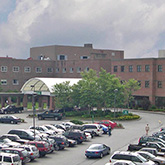At Central Vermont Medical Center our Cardiologists perform routine and nuclear cardiac stress tests to determine how your heart responds to increased activity.
Different types of Cardiac Stress Tests are done at Central Vermont Medical Center. These include:
Routine Cardiac Stress Test
In this test, the patient walks on a treadmill at increasingly higher levels of exertion. This is done because some heart problems occur during activity, and not at rest. When exercising, the heart needs more blood and energy. If it doesn't get that, there is chest pain, shortness of breath or dizziness. If such symptoms occur during stress testing, the problem can be identified and treatment started. While the patient exercises, the patient's heart rhythm, blood pressure, and breathing are monitored.
Preparation for Cardiac Stress Test
- Eat a light breakfast.
- Wear comfortable loose fitting clothing appropriate for exercise.
- Wear comfortable shoes or sneakers- no slippers or heels.
- Bring a list of all your medications, how much you take and how often.
Nuclear Cardiac Stress Test
This test helps measure how much blood flows through coronary arteries (the arteries supplying blood to the heart muscle). A small, safe dose of radioactive material is injected into a vein in the patient's arm. After 30 minutes, a nuclear medicine camera will scan the patient's chest. The camera can detect the radioactive material in the heart muscle. The patient is then asked to exercise on a treadmill. Patients who can not exercise on a treadmill will receive medicine through an intravenous line which will simulate exercise. During this stress test, a second small dose of radioactive material is given. After the stress test is done, the camera will scan again. The doctor will compare both scans to see if there are any areas where blood flow to the heart is reduced.
Preparation for a Nuclear Stress Test
This test is frequently done in two stages on different days.
Day 1: Resting images are done in Diagnostic Imaging
- Eat a light breakfast before your appointment.
Day 2: Cardiac Stress images
- No breakfast. Do not eat or drink anything after midnight the night prior to your cardiac stress test.
- Do take your regularly prescribed medications unless you have been directed by your physician to NOT take them.
- Wear comfortable loose fitting clothing appropriate for exercise.
- Wear comfortable shoes or sneakers- no slippers or heels.
- Bring a list of all your medications, what and how much you take and how often.


